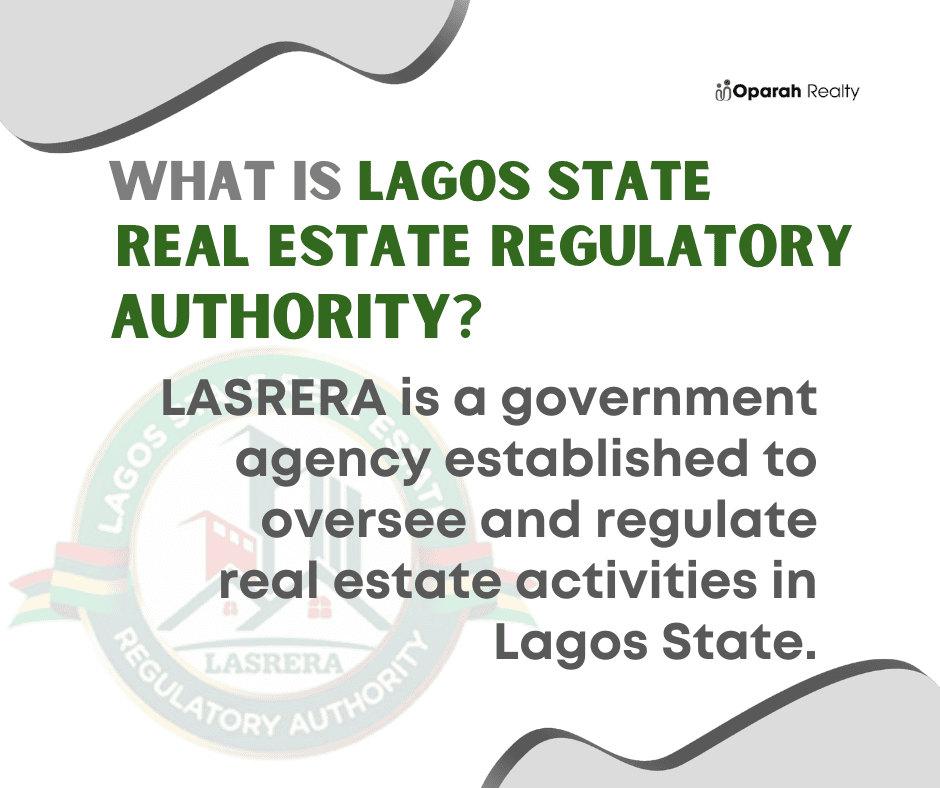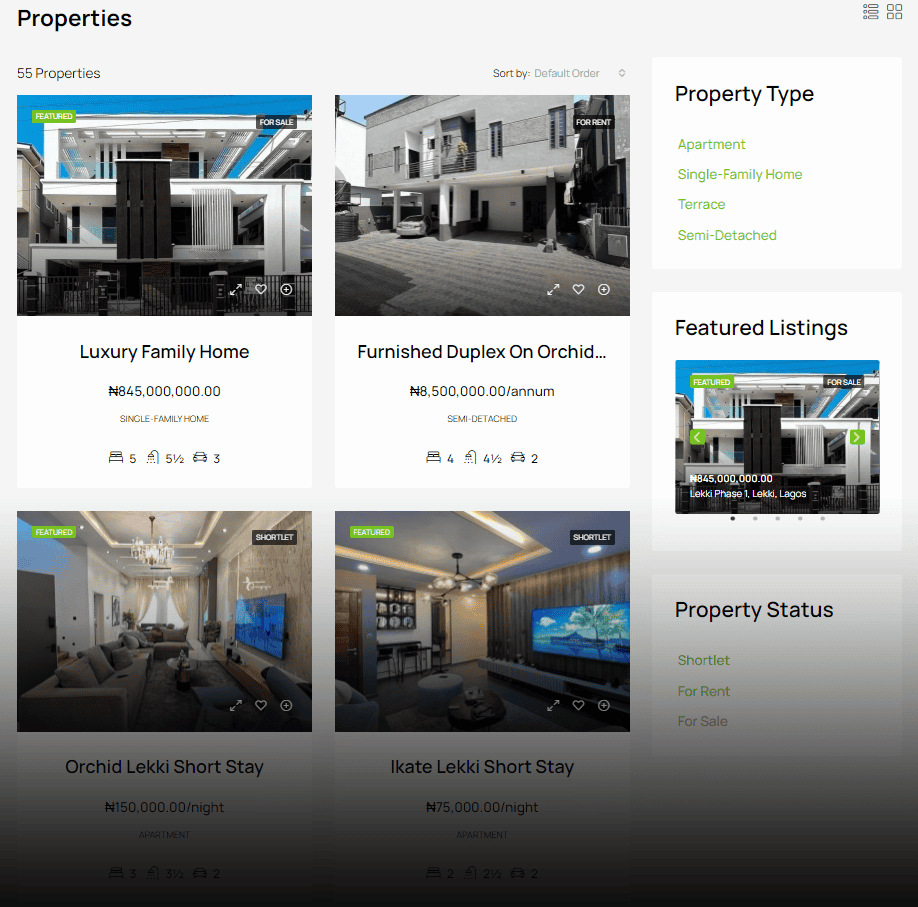Lagos State Real Estate Regulatory Authority

by Bright Ugochukwu
Feb 21, 2025
The Lagos State Real Estate Regulatory Authority (LASRERA) has been a game-changer since it was signed into law in 2022.
Designed to protect residents from shady real estate practices, this law has set new standards for the industry.
In this article, we will cover topics like:
- Lagos State Regulatory Authority
- Understanding LASRERA
- Key Provisions
- Role of LASRERA
- Registration and Permits
- Challenges and Controversies
- Future of Regulation in Lagos State
It aims to put an end to fraudulent activities by requiring proper registration and compliance from real estate professionals.

LASRERA monitors, regulates, and keeps data on all real estate transactions in the State. Register, issue permits and keep a record of all real estate practitioners.
LASRERA’s establishment marks a significant step in cleaning up the real estate sector in Lagos, ensuring fair and transparent transactions for everyone involved.
Takeaways
- LASRERA was established to curb fraudulent real estate activities in Lagos.
- The law requires real estate agents to register and obtain permits.
- Non-compliance with the law can lead to hefty fines and penalties.
- LASRERA plays a crucial role in monitoring and resolving disputes in the real estate sector.
- The law impacts both local and foreign real estate investors in Lagos.
What is the Lagos State Real Estate Regulatory Authority?
The Lagos State Real Estate Regulatory Authority, also known as LASRERA, is a government agency set up to oversee and regulate real estate activities in Lagos State.

Its primary mandate is to ensure transparency in the market, protect the interests of consumers, enforce ethical practices among real estate professionals, and promote sustainable development within the sector.
Understanding the Lagos State Real Estate Regulatory Authority
Purpose and Objectives of the Authority
The Lagos State Real Estate Regulatory Authority, often referred to as LASRERA, was set up to bring order to the busy real estate scene in Lagos.
This authority is all about making sure that real estate transactions are transparent and fair.
Its primary aim is to protect residents from fraudulent real estate practices.
Lagos has a dynamic real estate market; that’s why we need a watchdog like LASRERA. The agency makes sure all transactions are clear and honest, which helps build trust with stakeholders.
Key Functions and Responsibilities
LASRERA has a bunch of responsibilities that keep it busy. They don’t just set rules but check if everyone follows them.
Here’s a quick rundown of what they do:
- Policy Formulation: They create policies that align with global standards to regulate real estate transactions.
- Registration and Permits: They maintain a comprehensive register of permits for real estate professionals.
- Complaints and Dispute Resolution: They investigate complaints and help resolve disputes involving real estate agents.
This authority acts as a sort of referee, ensuring that everyone plays by the rules.
Impact on Real Estate Transactions
The impact of LASRERA on real estate transactions in Lagos is significant.
They help in reducing cases of fraud and malpractice by enforcing regulations. This has made buying, selling, or renting property safer for everyone.
LASRERA has introduced a new level of accountability that wasn’t there before. For many, dealing in real estate now feels less like a gamble and more like a structured process.
Pro Tip: LASRERA’s launch starts a new era for Lagos’s real estate. Now, transparency and accountability are the standard, not the exception.
Key Provisions of the Lagos State Real Estate Regulatory Authority Law
Registration Requirements for Real Estate Agents
The Lagos State Real Estate Regulatory Authority Law requires all people involved in real estate transactions to register.
This includes property developers, facility managers, and property management companies.
Registration is more than a formality. It’s a way to make sure that only qualified people and organizations can operate in the market.
This step is key to stopping fraud that has affected the sector in the past. To register, agents must meet specific criteria and pay a prescribed fee.
Penalties for Non-Compliance
Non-compliance with the law’s provisions can lead to severe penalties.
Violations can lead to fines or permit suspensions. And, the outcome depends on how serious the violation is.
The aim here is to enforce discipline and ensure that all stakeholders adhere to the regulations.
The law is quite clear; if you want to play in the real estate field, you must follow the rules. This protects consumers and creates a fair ground for all professionals.
Dispute Resolution Mechanisms
Disputes are inevitable in any sector, and real estate is no exception.
The law has put in place mechanisms for resolving disputes between parties quickly and fairly.
These mechanisms aim to reduce the time and cost involved in litigation, offering an efficient and effective alternative.
Mediation and arbitration are some of the methods encouraged under the law. This approach solves problems and strengthens relationships between those in real estate transactions.
Pro Tip: The Lagos State Real Estate Regulatory Authority Law marks an important move for a clear and accountable real estate market. Its provisions aim to protect consumers and ensure that only qualified professionals operate in the sector.
The Role of LASRERA in Regulating Real Estate Transactions
Monitoring and Compliance
The Lagos State Real Estate Regulatory Authority (LASRERA) plays a crucial role in keeping the real estate sector in check.
Ensuring compliance with state laws is one of its key responsibilities.
They conduct regular inspections and audits to make sure everyone is playing by the rules.
It’s not only about catching the bad guys. It’s also about making a fair environment for everyone involved.
LASRERA keeps a detailed database of real estate transactions. This helps them quickly spot and fix any discrepancies or irregularities.
Policy Formulation and Recommendations
LASRERA doesn’t just enforce rules; it helps shape them.
The authority develops policies that reflect both local needs and global best practices. These policies are then recommended to the state government for implementation.
This proactive approach helps adapt to the ever-changing dynamics of the real estate market.
LASRERA keeps up with trends, ensuring Lagos stays attractive and secure for real estate investments.
Handling Complaints and Petitions
Handling disputes is another critical function of LASRERA.
The authority offers a clear way for real estate professionals and the public to share their complaints.
When complaints arise, LASRERA investigates and mediates to find an amicable solution. This resolves individual issues and builds trust in the regulatory framework.
LASRERA acts as a mediator.
This helps keep peace in the real estate sector, ensuring conflicts are resolved fairly and quickly.
Registration and Permits Under the Lagos State Real Estate Regulatory Authority
Eligibility Criteria for Agents and Organizations
If you want to start a real estate business in Lagos, here’s a checklist to follow.
For individuals, you gotta be a Nigerian citizen or have a valid work permit if you’re not. Age-wise, you need to be at least 18.
Plus, you need a Lagos State Residents Registration Agency (LASRRA) number and a proper office space in Lagos.
Education?
At least a WASSCE, GCE, or NECO certificate.
Keep your business records squeaky clean and have a separate client account. Oh, and don’t forget the three years’ tax clearance certificate and a registered business name with the Corporate Affairs Commission (CAC).
For corporate bodies, the rules are pretty similar.
You need a CAC registration, proper transaction records, and a separate client account.
Make sure any non-Nigerian directors have valid work permits. And, of course, that three-year tax clearance certificate is a must.
Process for Obtaining Permits
Once everything is in order, it’s time to apply for your permit.
The process is pretty straightforward.
First, ensure all your documents are ready and up to date. Then, you’ll need to pay the prescribed fee as set by the authority.
Once that’s done, submit your application. If everything checks out, you’ll get your permit, which is valid for one year.
Validity and Renewal of Permits
So, you’ve got your permit, but it’s not forever.
It’s valid for just a year.
Make sure you renew it at least two weeks before it expires.
To renew, you’ll need to show that you’ve stuck to all the rules and conditions set out in the law. If you don’t, there are penalties waiting for you.
For individuals, it’s at least ₦250,000.00, and for companies, it’s ₦1,000,000.00.
Pro Tip: Staying compliant keeps you in business and helps maintain the integrity of the real estate sector in Lagos. Keeping up with these permits and regulations might seem like a hassle, but it’s all about ensuring a fair and transparent market for everyone involved.
Challenges and Controversies Surrounding the Lagos State Real Estate Regulatory Authority
Legal Challenges and Court Cases
The Lagos State Real Estate Regulatory Authority (LASRERA) has faced its fair share of legal hurdles.
A significant legal battle revolves around the power of the Lagos State Government to establish LASRERA.
The Estate Surveyors and Valuers Regulatory Board of Nigeria and the Nigerian Institute of Estate Surveyors and Valuers have challenged the authority’s legitimacy in court.
They argue that the state lacks the jurisdiction to regulate estate surveyors and valuers, which are traditionally under federal oversight.
This legal battle shows how complex jurisdictional boundaries are in Nigeria’s legal system.
Concerns from Real Estate Professionals
Real estate professionals in Lagos have voiced concerns over the stringent regulations imposed by LASRERA.
Many feel that the registration requirements and penalties for non-compliance impose excessive burdens.
Many agents and developers resist registering with LASRERA; some believe it creates extra bureaucracy and costs.
Moreover, the penalties for non-registration, which can be hefty, have been criticized for being too harsh, potentially stifling smaller players in the market.
Impact on Foreign Investors
Foreign investors are also feeling the impact of LASRERA’s regulations.
The law mandates that foreign entities must obtain explicit permission from the Governor to engage in real estate transactions in Lagos.
This requirement can be seen as a barrier to entry, potentially deterring foreign investment.
Additionally, the stipulation that foreign investments in land cannot exceed 25 years, including renewal options, adds another layer of complexity. These rules might put off foreign investors who want stability for their long-term investments.
Pro Tip: LASRERA is a bold move to regulate Lagos’s chaotic real estate market. It also highlights challenges that require careful handling to balance rules and growth.
The Future of Real Estate Regulation in Lagos State
Potential Reforms and Amendments
The real estate scene in Lagos is always changing. So, the rules must change, too.
Potential reforms could include streamlining the registration process for real estate agents, making it more efficient and less cumbersome.
There’s talk of changing laws to better protect local and foreign investors.
This may mean looking again at the 25-year limit on foreign land ownership. Such changes could make Lagos more attractive to international investors.
Long-term Impact on the Real Estate Market
The long-term impact of regulatory changes is a hot topic among real estate professionals. These adjustments could lead to a more transparent and trustworthy market if done right.
A few possible outcomes might include:
- Increased foreign investments due to more favourable terms.
- A rise in local property development projects.
- Greater protection for consumers against fraudulent practices.
However, any reform will need to balance investor interests with consumer protection.
Role of Technology in Regulation
Technology is set to play a big role in the future of real estate regulation in Lagos.
Using digital platforms for registration and compliance checks can make processes easier and lower the chances of fraud.
Imagine a system where you can verify a property’s legitimacy with just a few clicks.
Blockchain technology might even come into play, offering an immutable record of property transactions. This could drastically reduce disputes and enhance transparency.
Pro Tip: As Lagos grows, so does its real estate sector. Regulation must be as dynamic as the city, embracing change and innovation. This way, we can ensure a fair and prosperous market for everyone.
Conclusion
The Lagos State Real Estate Regulatory Authority (LASRERA) is a big step forward for the real estate scene in Lagos.
It’s like a new sheriff in town aiming to clean up the mess shady agents and scammers left. With this law in place, there’s hope for a more transparent and fair real estate market.
It’s still early, and there may be bumps ahead. But, the groundwork is laid for a safer space for investors and residents.
Lagos is growing fast. A strong regulatory body like LASRERA ensures that the real estate industry thrives without the usual chaos. It’s a promising start, and only time will tell how effective it will be in the long run.
Frequently Asked Questions
Why was the Lagos State Real Estate Regulatory Authority Law created?
The law was created to address fake real estate agents and developers who trick and defraud people looking for a place to live. It sets rules to ensure transparency and accountability in real estate transactions.
Who needs to register with LASRERA?
All real estate agents, property developers, facility managers, and property management companies operating in Lagos State must register with LASRERA to legally conduct their business activities.
What happens if a real estate agent does not register with LASRERA?
Agents who fail to register with LASRERA may face penalties, including fines. For individuals, the fine is at least N250,000.00, and for companies, it is at least N1,000,000.00.
Can foreigners work as real estate agents in Lagos?
Yes, foreigners can work as real estate agents in Lagos, but they must obtain written consent from the Governor of Lagos State through LASRERA. They must also comply with specific regulations and limitations.
How does LASRERA help resolve disputes?
LASRERA has a Committee of Inquiry that investigates complaints against licensed agents. It can mediate disputes and, if necessary, refer criminal cases to the police for further action.
